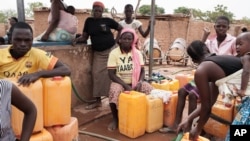Water trickles out of the faucet sometimes around 2 a.m., and by dawn the taps run empty at Dramane Drabo's laundry business. It could be days before any more water returns, he laments.
Across Burkina Faso's capital, even the wealthiest neighborhoods, typically spared from such shortages, are suffering without water amid an unprecedented heat wave. Already the short supply has increased the price of a barrel of water more than 10 fold from just a few months ago.
Women and children are lining up for hours to get water from the capital's few public wells and government trucks carrying water tanks. And business owners like Drabo who are reliant on water ask how they can continue.
"We heard that there is a program to relieve us but we are still waiting to see its effects,'' said Drabo, whose business is in one of the worst hit in the south of the capital, Ouagadougou. " It's been about two months since we have had water during the daytime.''
Burkina Faso, a landlocked country in the heart of West Africa, is one of the poorest of the sub-region. Every year, during the dry season which goes from March to June, its people suffer very serious water and electricity cuts. In recent weeks, though, temperatures have hit as high as 111 degrees Fahrenheit (44 degrees Celsius), putting a strain on a water system also challenged by a growing population.
The water shortage comes as Burkina Faso struggles to regain its footing after years of political turmoil that culminated in a popular uprising in 2014 that pushed from office the president of 27 years. The transitional government was then briefly rocked by an attempted coup before last year's democratic elections brought President Roch Marc Kabore to power.
Unseasonably hot weather for increased demand for water in this city of 2 million, said Hamado Ouedraogo, the director general of the National Office for Water and Sanitation. Ouagadougou is also growing faster than expected, with the population growing 6 percent a year, he said.
"We have made the decision for alternate distribution of water in Ouagadougou to make sure that the little water we have reaches everybody. Those who never had water cut-offs in parts of the city will experience it now. It is just a matter of equity,'' he said.
Ouagadougou is being divided into two zones, and each is supposed to have water for 12 hours a day. Frustrated citizens, though, say that is not happening.
Tarwindpanga Konditamde, a mechanic who also washes motorcycles, has seen his income plummet. A 20-liter container of water now costs 500 francs ($0.87) instead of a mere 30 ($0.05) at the beginning of the year.
"And I cannot even get water. I have to queue up from 6 a.m. to 10 a.m. but often I go back home with an empty can,'' he says.
The government says it's working to increase the supply, but says there is poor production capacity at the main dam about 30 kilometers (19 miles) from the capital. Teams are trying to rehabilitate wells, and some wealthy people have their own private wells on their properties.
Arouna Tiendreogo, a mason and brick seller, fears for his business.
"I have already lost a lot with the bricks breaking for lack of water to spray them. With the bag of cement at 6,000 francs ($10.42) each, I pray that God and the national water company understand us and come up with solutions.''




